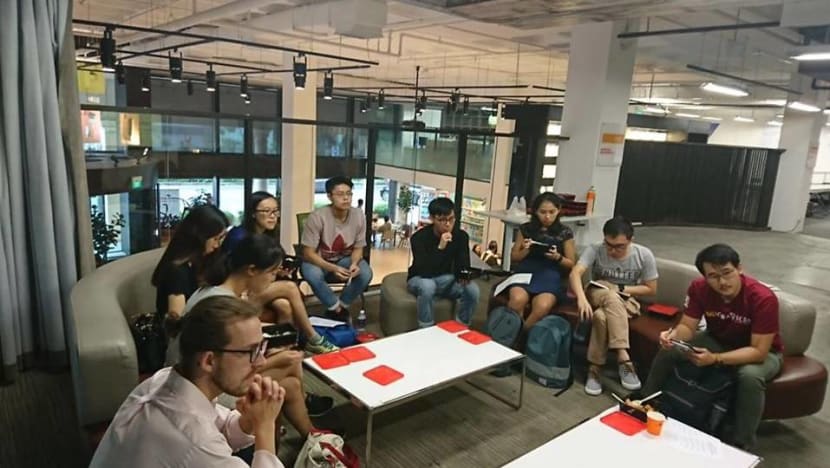commentary Singapore
Commentary: The power of Singapore's social entrepreneurs in a profit-driven world
More Singaporeans are turning to social entrepreneurship to address society’s most pressing issues, and rejuvenating the call to help the less fortunate, argues Lien Centre for Social Innovation's executive director Jonathan Chang.

Social enterprises are redefining success in terms of the economic, social and environmental impact their businesses can generate. (Photo: Work Central Offices)
SINGAPORE: Today marks Singapore’s 52nd anniversary as an independent country. A mixture of foresight and bold decisions have contributed to a stable, prosperous and resilient society.
Everywhere we look, we see signs of economic development and wealth creation. Yet, we face growing social challenges such as a rapidly ageing population and rising costs of living.
Policymakers and social workers have stepped up to meet these challenges through many of their social initiatives, but these are often too large in scale for them alone to handle. Many also require assistance that enable aid recipients to help themselves, to be sustainable.
In this context, the entry of a unique group of impact innovators called social entrepreneurs can bring renewed optimism to invigorating the case for building an inclusive society.
THE TRIPLE BOTTOM LINE
A social entrepreneur is an entrepreneur who broadens the definition of business success beyond loss and profit to what is known as the triple bottom line: Defining success instead in terms of the economic, social and environmental impact they create.
Like traditional for-profit companies, social enterprises aim to be financially profitable. But what sets social enterprises apart is that their businesses and business models are designed to achieve a social mission.
Take the example of BloomBack, founded in 2016 by Hazel Kweh. Its e-commerce platform empowers women receiving palliative care in hospice care centres or those undergoing treatment for breast cancer, by training them to create floral arrangements and listing their products online.

Through repurposing used flowers from nearby events to minimise waste, BloomBack also takes steps to minimise its ecological impact, even when their primary mission is not an environmental one.
A NEW GENERATION OF SOCIALLY CONSCIOUS LEADERS
The way BloomBack’s business model matches customers to florists, promotes floral sustainability, and creates income opportunities for women shows how social entrepreneurs can tackle unmet, unnoticed and emerging needs.
By engaging society through business, social entrepreneurs generate sustainable social change. As in the case of BloomBack, social enterprises empower beneficiaries and give them control as well as financial independence. They transform the traditionally dependent relationship between donor and beneficiary in many philanthropic models into a two-way, mutually beneficial one.
Moreover, social entrepreneurs design solutions tailored to address the root causes of social issues, particularly because many have experienced those issues first-hand.
Founder of Eighteen Chefs Benny Se Teo drew upon his life story as a former drug addict and struggles to find a job to establish a profitable local restaurant chain, which employs and trains ex-offenders and troubled youths. Chef Benny, in a sense, has given these ex-offenders a second chance in life.

Another example is Homage, an online platform that provides on-demand caregiving services by trained nursing and homecare experts to the elderly in Singapore.
The founders of Homage Gillian Tee, Lily Phang, and Tong Duong recognised the need for in-home care for the elderly, who currently number more than 450,000 in Singapore’s rapidly ageing population and saw opportunity to match these needs with a growing pool of freelance healthcare professionals in Singapore. Homage raised US$1.2 million (S$1.63 million) in funding from US investors.
The success stories of social entrepreneurs like Hazel Kweh, Chef Benny and others raise public awareness of the social causes they champion, and motivate others to be changemakers - galvanising the current and next generation of potential social sector talent.
This is why I believe that social entrepreneurship is a compelling answer to the social challenges that Singapore faces today, as well as the ones to come.

SEPARATING THE SERIOUS FROM THE CURIOUS
Committed social entrepreneurs are deeply in touch with who they are and what their purpose is. They live mission-driven lives, they are willing to suffer and make sacrifices for what they believe in, and they find ways to appreciate the risk, uncertainty, early failures and impossible hours.
All these first stem from a sense of self-awareness.
Those who understand that what they are doing has a greater purpose will take the ups and downs of starting and growing a business in their stride. They don’t give up or waver when times are difficult.
As the Executive Director of the Lien Centre for Social Innovation, I have interacted with many social innovators, and I have always looked for that “fire” or “spark” that I know will outlast their ideas, and that will push them to dust themselves up and try again - even when those ideas fail.

UNLOCKING THE POTENTIAL OF SOCIAL ENTREPRENEURSHIP
Many shun the social sector because they believe that pursuing social goals often means great financial sacrifice. On top of that, there is a common idea that profit shouldn’t exist in social entrepreneurship, and that every dollar that a social enterprise earns should go directly to its beneficiaries.
Yet profit-making and social impact are complementary and interdependent.
Profit is not a dirty word. Profits protect social enterprises from economic shock, allow them to attract top-tier talent, and fund new initiatives and expansion—sustaining their social mission.
One success story of a global social enterprise is Whole Foods Market, the organic groceries supermarket chain that was acquired by Amazon for $13.7 billion (S$18.6 billion).

A RIPPLE OF CHANGE
Social entrepreneurship does not intend to replace the role of non-profits and government in solving social problems, but act as a complementary champion that makes extraordinary progress on some of these issues.
As we celebrate this year’s National Day, perhaps we can come together and recognise that we all have a role to play in encouraging, supporting and empowering social entrepreneurs as policymakers, innovators, and consumers.
For they are powerful changemakers of our time that can drive growth for Singapore and ensure that growth is inclusive, sustainable and impactful.
Jonathan Chang is executive director of the Lien Centre for Social Innovation at the Singapore Management University.












